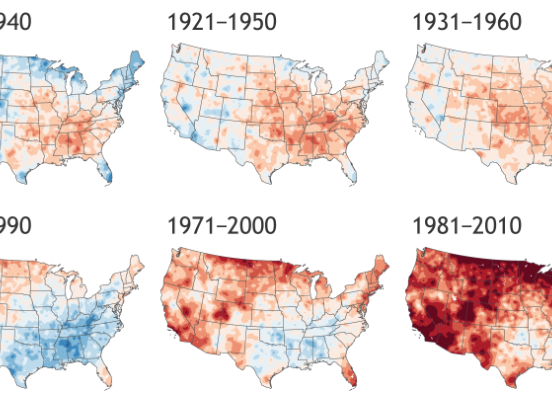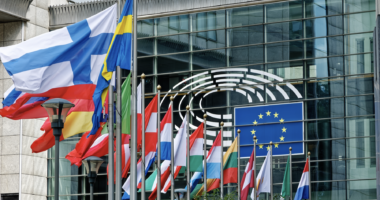Climate, Health and Equity Brief
Zombie fires, power failures and heat stroke
May 9, 2021

The Climate, Health & Equity Brief is GMMB’s take on the week’s news on the current impacts of climate change. If you haven’t subscribed yet, you can do so by clicking here.
Hot Topic: Feeling the Heat. New data from the National Oceanic and Atmospheric Administration (NOAA) shows that the average temperature in the U.S. has risen 1.7°F (about 1°C) since data collection began in 1901—with the majority of that warming taking place in just the last 40 years. As science continues to prove, small changes in average temperatures can fuel significant changes in climate patterns and extreme weather. For example, an increase of just 1°F means the difference between 14 and 37 percent of the world’s population being exposed to severe heat.
Another distressing new study found that as heat waves have intensified across the U.S. in recent years, power failures have also increased, jumping by more than 60 percent nationwide since 2015. Computer models studying the U.S. cities of Atlanta, Detroit and Phoenix show that the simultaneous occurrence of a heat wave and a power failure in those cities would put at least two-thirds of their residents at risk of heat exhaustion or heat stroke.
Extreme heat is also putting the food security and health of people in South Asia and sub-Saharan Africa at ever-increasing risk. In these regions, more than a billion people lack access to air conditioning, refrigeration and/or other cooling technologies, making unbearable temperatures inescapable. And an estimated 2.3 billion additional people around the world have cooling systems that are inefficient and/or unreliable, particularly during times of extreme heat.
Perhaps the strangest new consequence of rising temperatures? Zombie fires. In Siberia—one of the three coldest regions on earth—fires from last summer are re-emerging from underneath the snow. This phenomenon takes place in areas with carbon-rich peat soil that allows fire to continue to smolder underground for long periods of time. Wildfires as a whole have increased in Siberia as climate change has made heat 600 times more likely in the region, and the smoke from current fires has left nearly 2 million Russians under “black sky” warnings, meaning that concentrations of fine particles and carbon monoxide in the atmosphere have reached levels so high that many find it difficult to breathe.
— Matt & Traci, GMMB
Health
NOAA’s latest decennial U.S. Climate Normals data show that the average U.S. temperature has increased by 1.7 degrees since data tracking began in 1901, with the majority of that warming happening in just the last 40 years. (NOAA, The Washington Post)
A new study analyzing the effects of extreme heat in Atlanta, Detroit and Phoenix found that more than two-thirds of residents are at risk from the overlapping threat of intensifying heatwaves and more frequent power failures, which have increased by more than 60 percent in the U.S. since 2015. (The New York Times)
Following above-average winter temperatures in Siberia, wildfires and zombie fires are already raging in the region, leaving nearly two million residents under a “black sky” air quality warning. (Gizmodo)
A new report in the journal Nature revealed that over the last decade, the Brazilian Amazon released 20 percent more carbon dioxide than it absorbed due to deforestation, making the rainforest a net emitter for the first time ever. (Phys.org)
Equity
As climate change exacerbates global extreme heat, a new report found that the agricultural, food and nutrition security of over one billion people in South Asia and sub-Saharan Africa are at high risk due to a lack of access to air conditioning and other cooling equipment. (ESI Africa)
Environmental justice advocates are protesting a proposed 1,000-mile pipeline that would run through the predominantly Black neighborhood of Riverside in Memphis, TN—an area whose residents already face cancer rates four times higher than the national average due to air pollution from surrounding industrial sites. (E&E News, Longread)
Politics & Economy
New research estimates that recently updated climate pledges from global leaders will limit end-of-century warming to 2.4°C—a 0.2°C improvement from current estimates, but still far above Paris Agreement target of 1.5 to 2°C to avoid the worst effects of climate change. (BBC)
As climate change exacerbates extreme weather events across the country, experts warn that the effects on agriculture could overwhelm farming lenders and destabilize the global economy and food supply. (InsideClimate News, Longread)
A new report analyzing 60 of the world’s largest commercial and investment banks revealed that the financial institutions continue to invest billions of dollars in fossil fuels annually despite recent high-profile climate pledges. (Vice)
In an attempt to weaponize climate fears, Arizona Attorney General Mark Brnovich (R) filed a lawsuit seeking to restore Trump-era immigration policies on the basis that immigrants will drive an increase in U.S. planet-warming emissions. (Grist)
“The world that we live in is a house on fire and the people we love are burning.”
– Poet and author Sandra Cisneros
Action
The Biden administration released a joint report detailing its America the Beautiful plan to conserve a third of America’s land and waters by 2030, which includes more than $2 billion in dedicated annual funding for parks and outdoor spaces. (AP News)
The EPA announced a new rule to phase down the production and use of hydrofluorocarbons (HFCs), a man-made chemical refrigerant, by 85 percent over the next 15 years—a move that is estimated to prevent the emissions equivalent of one out of seven registered U.S. vehicles. (AP News)
The Millennium Challenge Corporation, an independent, U.S.-based foreign aid agency, pledged to dedicate more than half of its annual $800 million in Congress-appropriated funds over the next five years to combating climate change and increasing climate resilience in developing African nations. (Voice of America)
Energy company American Electric Power announced that it will close its Indiana-based Rockport Generating Station—currently one of the 10 largest coal-fired plants in the U.S.—by 2028, making it the only U.S. coal refinery to schedule a complete shutdown before 2030. (InsideClimate News)
Kicker
Looking for something new to listen to? Check out this season of the Broken Ground podcast featuring women fighting for environmental justice.






